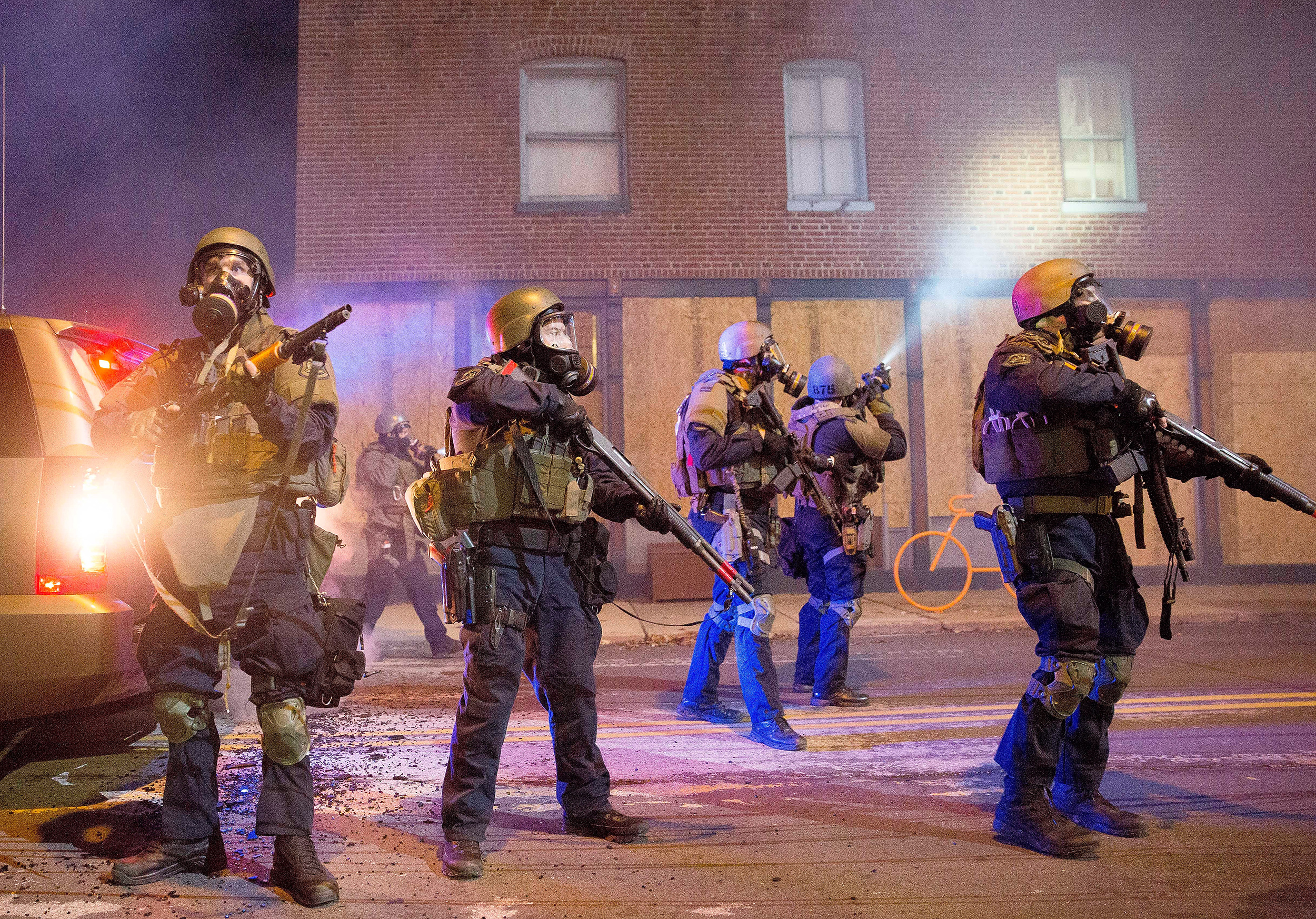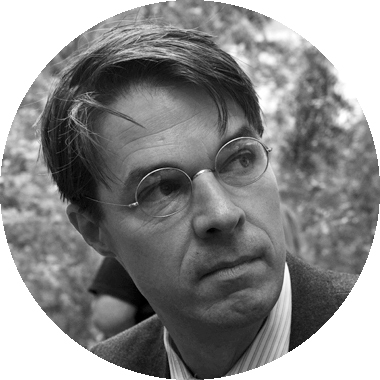The Man and me
If I were black I would've been shot to death countless times by now


A free daily email with the biggest news stories of the day – and the best features from TheWeek.com
You are now subscribed
Your newsletter sign-up was successful
We tell children that the police are their friends — that if they're ever lost or scared they can always trust a man in blue. Like a lot of the things we tell kids, this is a truth edited for children, like the weaker-dosage, candy-flavored medicines we administer to them. We also tell children not to worry about death. We reassure them we're certainly not going to die anytime soon, and they aren't going to die for a very, very long time. But we know that infants die in their cribs, toddlers are hit by cars, kids get leukemia, and sometimes policemen kill 12-year-olds.
We're having a rare and uncharacteristic moment of anti-cop sentiment in America. As with the furious backlash against rape on college campuses, it seems as if after decades of indifference everyone has suddenly and simultaneously had enough of the police killing unarmed black men. Anyone who wants to can now watch videos of cops gunning down a shopper suspiciously holding a BB rifle in the BB-rifle aisle of a Walmart, blowing away a kid futzing around with a toy gun in a park, or idly suffocating a father of two on a sidewalk while he begs for his life. And ever since the televised police response to the Ferguson riots, which looked less like crowd control than the Soviets crushing the Prague uprising, a lot of Americans finally seem to have noticed that we appear to have been invaded by an occupying army, one that regards us not as a citizenry to protect but a hostile populace to suppress.
I still remember how dystopian it seemed the first time I saw police holding automatic weapons in the subway, as if America had become some banana republic or besieged Middle Eastern hellhole. In the institutional hysteria that followed 9/11, the feds started handing out pricey, hi-tech, semilethal Batgear to local podunk police forces. This country has become so weaponized and coked up on Fear that every responding officer now regards each call as the next Newtown or Boston Marathon bombing. It's enough to give anyone considering dialing 911 pause, since it now seems tantamount to calling in a hit on someone. The recent Amnesty International report on the Ferguson riots said: "Equipping officers in a manner more appropriate for a battlefield may put them in the mindset that confrontation and conflict is inevitable rather than possible, escalating tensions between protesters and police." Or, as the well-known adage has it: If your only tool is a gun, every problem starts to look like a corpse.
The Week
Escape your echo chamber. Get the facts behind the news, plus analysis from multiple perspectives.

Sign up for The Week's Free Newsletters
From our morning news briefing to a weekly Good News Newsletter, get the best of The Week delivered directly to your inbox.
From our morning news briefing to a weekly Good News Newsletter, get the best of The Week delivered directly to your inbox.
When I say "Americans" have suddenly noticed this, I'm using the same sort of historically disingenuous language as when we say Columbus "discovered" America What I really mean is that even some rich white people have begun to notice what black people and poor people of all colors have been aware of for a long time.
I've always secretly felt a little less white in this regard than most of my fellow Honky-Americans. Although I go about my day camouflaged as a law-abiding citizen, secure in the semiotic Kevlar of an English complexion and an Italian overcoat, I've always harbored a secret terror and loathing of the cops. Once when a blind date of mine became blacked-out drunk and could or would not tell me where she lived so I could take her home, I briefly considered turning her over to some police officers I saw nearby, but in the end I could not bring myself to violate the principle: Never turn anyone over to the cops. (Also, I feared that it would somehow result in me spending the night in jail.) On the most hypocritical day of my life so far, I 1.) reported some drug dealers outside my apartment (whose clients kept breaking in and taking my laptops) and 2.) bought drugs. I regret only one of these things.
My instinctive horror of authority dates back to my first trip to the vice principal's office in second grade, and since I spent my entire young adulthood in the commission of one continuous misdemeanor, it's instilled in me a certain reflexive wariness of The Man. Luckily I was able to careen around publicly intoxicated with pocketfuls of dangerous controlled substances under the indifferent gaze of campus security instead of the streetcorner surveillance cameras of the Baltimore City Police. If I were black I would've been shot to death countless times by now.
This no-goodnik attitude makes me an aberration among white people in this country. The United States is a reactionary nation at heart; I've always suspected Nixon was probably right when he invoked his Silent Majority, those loyal TV-watching Americans who figure that any longhaired college kid, commie agitator, gun-hoarding wacko, or ghetto gangbanger the cops execute probably had it coming. Anytime the police are publicly second-guessed or taken to task for having riddled another unarmed black kid with bullets, bludgeoned a senior citizen or a schizophrenic, tear-gassed some college kids, or tasered a dad in front of his screaming children, a certain genus of commenter always comes heroically to their rescue — protecting the powerful, defending the well-armed, speaking out on behalf of those who have only bullhorns.
A free daily email with the biggest news stories of the day – and the best features from TheWeek.com
These commenters always explain that the beaten/deceased was breaking the law — shoplifting cigarillos, selling illegal cigarettes, resisting arrest, acting suspicious — and there have to be consequences for lawbreakers. What about this, they wonder, do we not understand? They like to say things like "it's very simple," "case closed," and "end of story." (It's hard to imagine what convoluted excuses they'll devise to explain why Akai Gurley should've known better than to walk into a stairwell. But they will.)
It's easy to dismiss these apologists as the usual chronically aggrieved and frightened bigots who make up the audience for Limbaugh and Fox. But their labored reasoning to justify why the victims of police violence all ultimately had it coming reminds me of the way in which we all subtly blame people who die in accidents or distance ourselves from people with cancer, trying to convince ourselves that this could never happen to us. It reminds me, too, of the tortured arguments of theodicy, theologians' attempts to explain God's hands-off attitude to Evil. They are trying to prop up and plug a sagging, leaky worldview in which the status quo is just, because to accept that it isn't would mean that everything they believe is a lie, that the institutions in which they've invested their faith and lives, their sons and tithes and taxes, are scams, crimes in which they're complicit.
I have had some positive interactions with the police, though it's worth noting that most of these have involved the police electing to leave me alone. (I hereby thank and salute the Baltimore police officer who let a friend and me off with a stern verbal warning to "stop impersonating Jesus.") Doing nothing is the best option in a surprising number of situations, but it's one that all authorities are constitutionally disinclined to exercise, as it they fear it might expose their own superfluity. And people in power can seldom resist an opportunity to start pushing other people around.
This is a temptation inherent in the position, not necessarily a flaw in the character of those who hold it. (Cf. the Stanford Prison Experiments in which subjects were arbitrarily divided into "jailers" and "prisoners," and within days the "jailers" had become sadistic martinets.) Although I regard the police as an institution with suspicion and resentment, I don't necessarily dislike them as people. Trudging up out of the guts of Grand Central's subway station in a Metropolis-like mob during one morning rush hour, I overheard a police officer say to his partner: "I love the faces in the mornings — they're almost just as good as the ones you see passed out on the subway." Which I guess evidences some casual contempt for the populace they're meant to Serve and Protect, but also a certain connoisseurship of the squalid human comedy that I cannot help but respect. I don't think the police are any worse, as individuals, than anyone else; I just find it prudent to bear in mind, at all times, that they can assault, abduct, or murder me without fear of any legal repercussion more serious than a lot of paperwork.
I think there must be some basic psychological divide between people who reflexively defer to authority and those of us whose impulse is to thwart and evade it. These two types have nothing but contempt for one another. Ultimately whether you instinctively identify with the police or the victims in these cases depends on your sense of whose side the police are on — on whether you feel invested in society's institutions or see them as aligned against you.
I don't believe the police are closet Klansmen or fascist lackeys; I also don't think they're heroes. They're people doing a job, and, like everyone else in the world, they do what the people who pay them tell them to do. The people who pay them are the government, and the government operates in the service of those who own it. In effect, the police are a heavily armed private security force to protect rich people against the poor — a role that became nakedly obvious to me the day our billionaire mayor ordered the NYPD to bulldoze the perfectly legal protest at Occupy Wall Street.
Join me, for a moment, in a wistful daydream: Let us picture the NYPD battering in the office door of Goldman Sachs — or of Lehmann Brothers, or Bear Sterns, or Morgan Stanley. Imagine an officer barking at the CEO to get down on the floor — "NOW!" — planting a knee in the small of his back and cinching the plastic cuffs around his wrists so tight his hands turn purple, while a bored detective informs him he is under arrest for 2,317,000 counts of criminal fraud and recites the Miranda. Maybe the CEO mouths off to a cop who tasers him, or has a heart attack in custody, or lunges for his desk to call security or legal and gets shot.
Notice how patently ludicrous, how obviously implausible this mental image is. Reflect, for a moment, on why that should be, and what it tells us about the country we live in.
Everyone who's paying attention — and I'm not talking about alarmist crackpots but the U.N., the Pentagon, the C.I.A. — agrees that the coming decades will see, to put it euphemistically, civil disturbances. The gap between the very rich and everyone else is only getting wider, meaning that more and more of us are finding ourselves on the wrong side of the police barricades. There will eventually be another financial crash, and sooner than we expect, because that's when they always happen. Climate change is predicted to cause famines, mass migrations, and wars. So bear in mind, as you watch the coverage of the next killing, the next grand jury decision, the next protests, and the next crackdowns: what the police are doing to black people now is what they may do to the rest of us next. Remember the images of the government abandoning the poor in New Orleans after Katrina, local police treating the citizenry like a turkey shoot. Remember the image of the National Guard massed in Ferguson with armored vehicles, tear gas grenades, and assault rifles, ready, if necessary, to quash an uprising of United States citizens. It probably won't be the last time we see it.
Last week, after the murder of two police officers, New York Patrolmen's Benevolent Association, the NYPD's union, announced: "We have, for the first time in a number of years, become a 'wartime' police department. We will act accordingly." Leaving us all to wonder — some of us a lot more uneasily than others — a war against whom?
Tim Kreider is an essayist and cartoonist. He divides his time between New York City and an Undisclosed Location on Maryland's Chesapeake Bay. His latest collection of essays is We Learn Nothing.
-
 How the FCC’s ‘equal time’ rule works
How the FCC’s ‘equal time’ rule worksIn the Spotlight The law is at the heart of the Colbert-CBS conflict
-
 What is the endgame in the DHS shutdown?
What is the endgame in the DHS shutdown?Today’s Big Question Democrats want to rein in ICE’s immigration crackdown
-
 ‘Poor time management isn’t just an inconvenience’
‘Poor time management isn’t just an inconvenience’Instant Opinion Opinion, comment and editorials of the day
-
 'Once the best in the Middle East,' Beirut hospital pleads for fuel as it faces shutdown
'Once the best in the Middle East,' Beirut hospital pleads for fuel as it faces shutdownSpeed Read
-
 Israeli airstrikes kill senior Hamas figures
Israeli airstrikes kill senior Hamas figuresSpeed Read
-
 An anti-vax conspiracy theory is apparently making anti-maskers consider masking up, social distancing
An anti-vax conspiracy theory is apparently making anti-maskers consider masking up, social distancingSpeed Read
-
 Fighting between Israel and Hamas intensifies, with dozens dead
Fighting between Israel and Hamas intensifies, with dozens deadSpeed Read
-
 United States shares 'serious concerns' with Israel over planned evictions
United States shares 'serious concerns' with Israel over planned evictionsSpeed Read
-
 Police raid in Rio de Janeiro favela leaves at least 25 dead
Police raid in Rio de Janeiro favela leaves at least 25 deadSpeed Read
-
 Derek Chauvin's attorney files motion for new trial
Derek Chauvin's attorney files motion for new trialSpeed Read
-
 At least 20 dead after Mexico City commuter train splits in overpass collapse
At least 20 dead after Mexico City commuter train splits in overpass collapseSpeed Read
